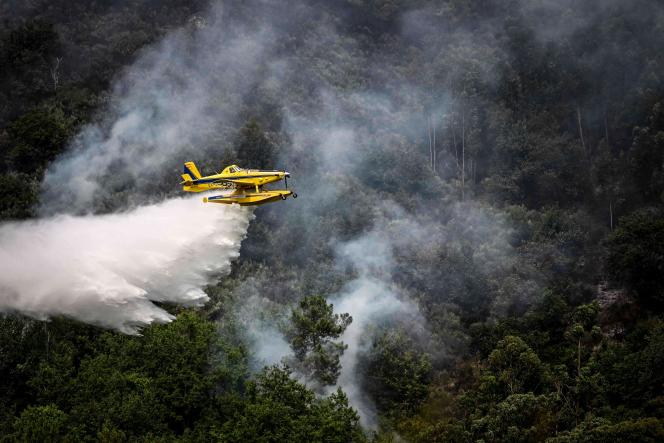Several Western European countries, including France, continued to battle devastating forest fires on Sunday, the result of a long-lasting heat wave that could break several temperature records early next week.
In the southwest of France, the mobilization of firefighters did not weaken to fix the fires, particularly in Gironde where nearly 10,500 hectares of forest have now gone up in smoke since Tuesday, in a context of generalized heat wave where temperatures could reach 40 degrees locally, according to Météo-France, which placed 37 departments on “heat wave” orange vigilance this Sunday.
Monday promises to be “the hottest for the west of the country”, forecasts Météo-France, which expects the 40 degree mark to still be reached in Brittany, Lower Normandy, Aquitaine and in western Occitania.
Calm in the Iberian Peninsula
Portugal experienced a lull on the fire front on Sunday morning. A single large focus, near the municipality of Chaves in the far north of the country, was considered active and “virtually under control” over 90% of its perimeter according to Portuguese civil protection. Nevertheless, almost all of Portuguese territory presented a “maximum”, “very high” or “high” risk to fires on Sunday, in particular the central and northern interior regions.
For Sunday, no red heat alert was issued by the Portuguese Meteorological Institute. This is the first time since July 8 that temperatures in Portugal are not expected to exceed the 40 degree mark.
According to the latest known report from Portuguese civil protection, the fires of the past week have left two dead and around sixty injured. According to his estimates, these fires have ravaged between 12,000 and 15,000 hectares of forest and brush since the start of the heat wave.
In Spain, around 20 forest fires are still raging and remain out of control in different parts of the country, from the south to the far northwest in Galicia, where the fires have so far destroyed around 4,400 hectares of land this week, authorities said.
Only 300 of the 3,000 people evacuated preventively near Malaga, in the far south, were authorized to return to their homes on Sunday.
The Spanish Meteorological Agency forecast “significantly high” temperatures over most of mainland Spain and the Balearic Islands in the Mediterranean on Sunday, with mercury expected to reach up to 42 degrees in the northern city of Logroño, and 40 degrees in Madrid and Seville.
UK red alert
In Greece, firefighters continued to fight an outbreak that broke out on Friday morning, causing the preventive evacuation of seven villages in a rural area of the prefecture of Rethymnon, on the island of Crete.
Further north in Europe, in the UK, the national weather agency has issued the first-ever ‘red’ alert for extreme heat, warning of a ‘risk to life’. The Met Office said temperatures in southern England could top 40 degrees for the first time on Monday or Tuesday.
This heat wave is the second in barely a month in Europe. The multiplication of these phenomena is a direct consequence of global warming according to scientists, with greenhouse gas emissions increasing in intensity, duration and frequency.
Elsewhere in the world, extreme temperatures have also caused forest fires, notably in northern Morocco where one person died and where half of the approximately 4,600 hectares affected went up in smoke.
Western Canada is also in the grip of flames, a fire ravaging since Thursday the region of Lytton, northeast of Vancouver, already devastated last year by a historic heat wave and devastating fires. The fire burned 1,500 hectares of forest and brush, destroying several homes and prompting evacuations.

















